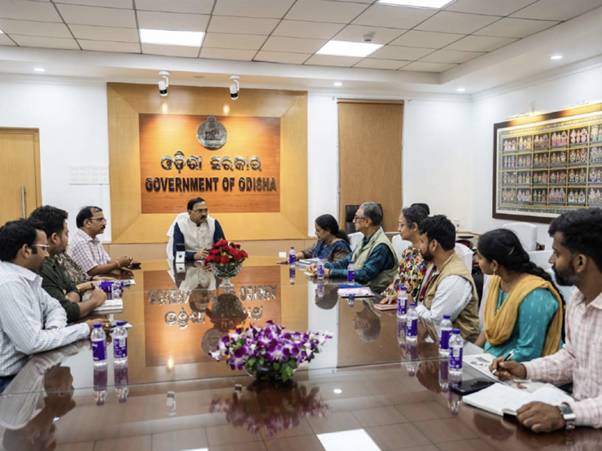Programs
- M. Tech. in Automotive Engineering -Postgraduate
- B. Sc. (Hons.) Biotechnology and Integrated Systems Biology -Undergraduate
Amrita Vishwa Vidyapeetham actively participates in co-operative planning for climate change–induced disasters by working closely with government agencies and local authorities to strengthen preparedness, response, and resilience. Through joint field assessments, early-warning system deployment, policy engagement, and capacity-building initiatives, the university supports coordinated approaches to managing climate-related hazards such as landslides, floods, and coastal risks. These efforts contribute to reducing loss, damage, and displacement, both within regions and across administrative boundaries, while ensuring that disaster planning is informed by scientific evidence, community needs, and evolving climate risks.
In 2024, Amrita Vishwa Vidyapeetham actively participated in co-operative planning for climate change–induced disasters through a joint field assessment in the landslide-affected regions of Mundakkai, Wayanad, in collaboration with the Kerala State Disaster Management Authority (KSDMA). An eight-member expert team from Amrita’s Center for Wireless Networks and Applications (AWNA) visited the affected sites to evaluate hazard conditions, population exposure, and the potential deployment of the Amrita Landslide Early Warning System (A-LEWS).
The visit followed a large-scale landslide disaster in July 2024 that resulted in significant loss of life and displacement. The assessment focused on strengthening early-warning-enabled evacuation planning, reducing future displacement risks, and supporting government decision-making under changing climatic conditions. As part of the cooperative response, Amma committed to funding the deployment of A-LEWS, reinforcing long-term disaster preparedness and community safety.
This joint government–university engagement contributes to integrated disaster risk reduction planning, combining scientific assessment, early-warning technology, and coordinated action to mitigate the impacts of climate-related disasters and reduce loss, damage, and displacement.
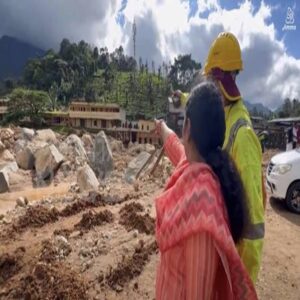
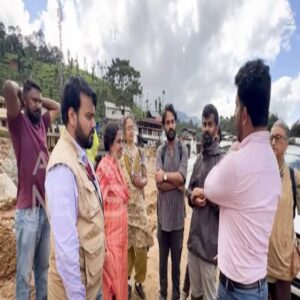
In 2024, Amrita Vishwa Vidyapeetham strengthened co-operative planning for climate change–induced disastersthrough the development of a Tsunami Evacuation and Shelter Map for Alappad Panchayat, Kerala, a coastal region highly vulnerable to tsunami risk. The initiative was implemented in collaboration with the Kerala State Disaster Management Authority (KSDMA) and the UNESCO Intergovernmental Oceanographic Commission (IOC), integrating scientific risk assessment with local governance and community participation.
The evacuation map combines geospatial analysis, hazard modelling, and community-validated evacuation routes, supporting early-warning response, safe evacuation, and shelter planning in the event of a tsunami. Local government leaders, district disaster management officials, researchers, students, and community members jointly participated in the planning process, ensuring that disaster preparedness measures are locally appropriate, inclusive, and actionable.
This initiative demonstrates how Amrita works with government agencies and coastal communities to strengthen early-warning systems, evacuation planning, and displacement risk reduction, contributing to coordinated climate disaster preparedness at the local level.
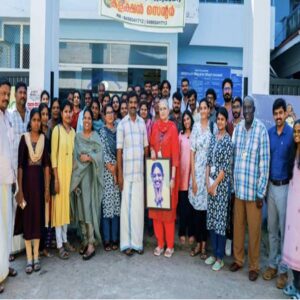
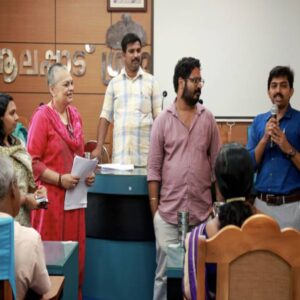
In December 2024, Amrita Vishwa Vidyapeetham hosted an international, multi-stakeholder conference on Tsunami Risk Reduction and Community Resilience, providing a collaborative platform for co-operative planning on climate-related disasters. The conference brought together key government authorities and international organisations, including the National Disaster Management Authority (NDMA), India, Kerala State Disaster Management Authority (KSDMA), Indian National Centre for Ocean Information Services (INCOIS), and representatives from UNESCO’s Intergovernmental Oceanographic Commission (UNESCO-IOC) and UNESCAP.
The conference facilitated structured dialogue between policymakers, scientists, and practitioners through technical sessions, policy discussions, and a dedicated certificate programme on disaster resilience. These engagements supported the integration of scientific evidence, early-warning systems, and community-based approaches into government disaster-preparedness and coastal-resilience planning, strengthening coordinated responses to climate-induced tsunami risks.

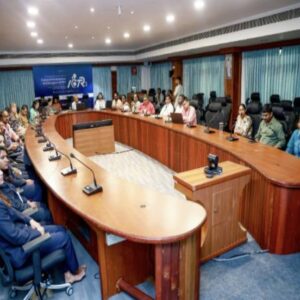
Amrita Vishwa Vidyapeetham’s leadership in co-operative planning for climate change–induced disasters continued to be reinforced in 2024 through its active status as a World Centre of Excellence on Landslide Risk Reduction (WCoE)under the International Programme on Landslides (IPL). The designation, re-conferred for the third consecutive termand valid until 2026, recognises Amrita’s sustained contributions to landslide risk reduction, early warning, and disaster preparedness over a multi-year period.
This recognition was announced at the 6th World Landslide Forum (Florence, Italy) and remains operational during 2024, supporting Amrita’s ongoing collaboration with government agencies, international organisations, and disaster management authorities
The award recognised Amrita’s landmark work on landslide early warning systems, including its peer-reviewed publication Landslide Early Warning Systems: Requirements and Solutions for Disaster Risk Reduction, India, and the deployment of AI-enabled IoT early warning infrastructure in high-risk regions such as the Western Ghats and the Himalayas. These systems have directly informed government-led evacuation planning, early warning dissemination, and displacement risk reduction, forming a core component of cooperative disaster planning in climate-vulnerable regions.
By retaining its World Centre of Excellence status through 2026, Amrita continues in 2024 to serve as a globally recognised technical and policy partner for governments addressing climate change–driven landslide hazards, contributing evidence-based solutions to disaster preparedness, response coordination, and long-term resilience planning.
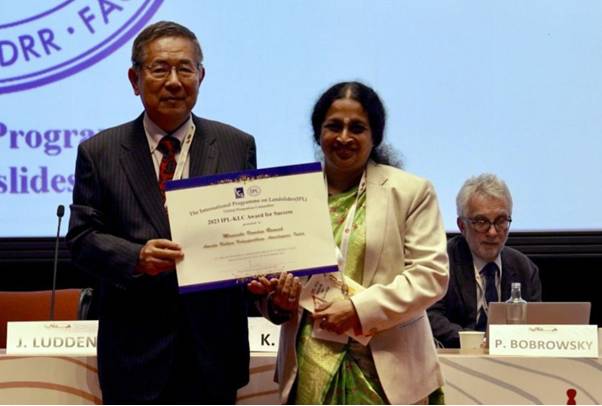
In 2024, Amrita Vishwa Vidyapeetham continued its strategic collaboration with the India Meteorological Department (IMD) to enhance multi-hazard risk modelling and early warning systems for climate-related disasters. Under a longstanding Memorandum of Understanding on Climate Change Risk Assessment, Modelling and Multi-Hazard Management, Amrita receives comprehensive meteorological data—including rainfall, temperature, and other atmospheric variables—from IMD’s national observation network, strengthening its disaster risk technology platforms.
This rich meteorological dataset feeds into the Amrita Landslide Early Warning System (A-LEWS), which integrates real-time monitoring of rainfall thresholds, soil moisture, pore-water pressure, and geophysical parameters to generate timely and reliable early warnings for landslides and related hazards. By integrating IMD data with local sensor networks, Amrita’s system supports enhanced anticipatory planning and risk reduction in collaboration with government partners, contributing to community resilience and reduced climate disaster impacts.
The MoU also enables joint research, capacity building, and training, facilitating knowledge exchange between university researchers and government scientists on climate risk modelling, dynamic hazard assessment, and impact-based early warning services—efforts that underpin cooperative approaches to disaster planning and community safety in the context of climate change.
In 2024, Amrita Vishwa Vidyapeetham strengthened its regional disaster-risk collaboration through a formal partnership with the Odisha State Disaster Management Authority (OSDMA) to advance climate-related hazard monitoring and early-warning capabilities in landslide-prone districts of Odisha. The MoU builds on Amrita’s globally recognised expertise as a World Centre of Excellence on Landslide Risk Reduction and expands the deployment of the Amrita Landslide Early Warning System (A-LEWS) to the eastern region of India.
Through this collaboration, Amrita provides scientific, technological, and capacity-building support to OSDMA, enabling the state government to adopt evidence-based approaches to hazard anticipation, risk communication, and evacuation planning.
